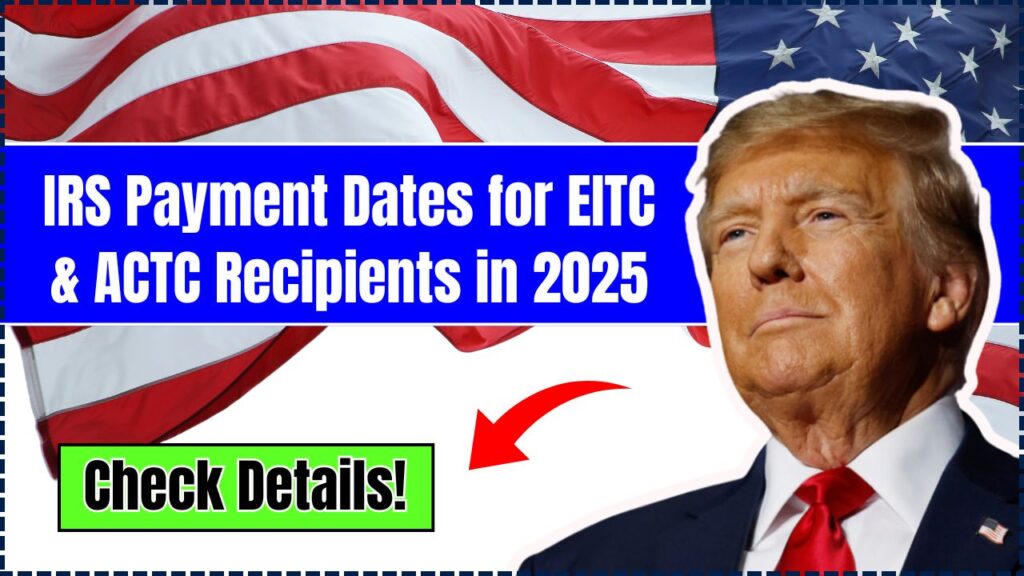
IRS Payment Dates for EITC & ACTC Recipients in 2025: If you are expecting a tax refund with the Earned Income Tax Credit (EITC) or the Additional Child Tax Credit (ACTC) in 2025, it’s crucial to understand the IRS payment schedule and potential delays. The PATH Act (Protecting Americans from Tax Hikes Act) mandates that the IRS cannot issue refunds for tax returns claiming EITC or ACTC before mid-February to help prevent fraudulent claims. This rule affects millions of taxpayers, making it essential to plan ahead.
In this guide, we’ll break down the 2025 IRS payment dates for EITC and ACTC recipients, provide filing tips, and share the best ways to track your refund status.
IRS Payment Dates for EITC & ACTC Recipients in 2025
| Topic | Details |
|---|---|
| IRS Refund Processing Start | January 27, 2025 |
| PATH Act Refund Hold Date | February 15, 2025 |
| First EITC/ACTC Refunds Expected | February 27, 2025 (for direct deposit filers with no errors) |
| Filing Method Impact | E-filing & direct deposit lead to faster refunds than paper filing |
| Common Delay Reasons | Errors, incomplete forms, IRS verification, amended returns |
| IRS Refund Tracking | “Where’s My Refund?” Tool |
If you’re claiming the Earned Income Tax Credit (EITC) or Additional Child Tax Credit (ACTC) in 2025, the IRS will not issue your refund before February 15 due to PATH Act regulations. For early filers, the earliest possible refund date is February 27, 2025.
To receive your refund as quickly as possible, ensure you:
- File electronically (e-file)
- Choose direct deposit
- Check your tax return for accuracy
- Use IRS tracking tools to monitor your refund status
Understanding EITC and ACTC Refund Delays
Why Are EITC & ACTC Refunds Delayed?
The PATH Act requires the IRS to hold refunds for tax returns that claim the Earned Income Tax Credit (EITC) or Additional Child Tax Credit (ACTC) until mid-February. This delay helps the IRS verify the legitimacy of the claims and prevent fraud. Even if you file your return on the first day of tax season, your refund will not be released before the specified date.
The earliest possible refund date for EITC/ACTC recipients in 2025 is February 27—and only if you filed electronically, chose direct deposit, and had no errors in your return.
How Does the PATH Act Affect You?
- If you file early (January 27 – February 15), your refund will still be held until after February 15.
- If you file after February 15, normal IRS refund processing times apply (usually 21 days for e-filing).
- Paper returns take longer—expect delays of six to eight weeks.
IRS Refund Processing Timeline for 2025
Here’s a step-by-step timeline of when you can expect your refund if you claim the EITC or ACTC:
| Date | Event |
|---|---|
| January 27, 2025 | IRS begins accepting tax returns |
| February 15, 2025 | PATH Act refund hold lifts |
| February 17-20, 2025 | IRS begins processing held EITC/ACTC refunds |
| February 27, 2025 | First refunds expected for early filers (via direct deposit) |
| March 3-7, 2025 | Paper check refunds begin arriving |
| March 15, 2025 | Most EITC/ACTC refunds issued by this date |
If you file later in the season, use the IRS “Where’s My Refund?” tool to track updates.
Breaking: These US States Just Raised Their Minimum Wage, Did Yours Make the List?
Breaking: Supreme Court Allows Workers to Sue States Over Delayed Unemployment Benefits
This $1,450 Social Security Payment Won’t Arrive in March! Here’s what the SSA explains
Best Ways to Get Your Refund Faster
To avoid unnecessary delays and get your refund as quickly as possible, follow these tips:
1. File Electronically (E-File)
- Paper returns take much longer (6-8 weeks vs. 2-3 weeks for e-filing).
- E-filing helps reduce errors and speeds up processing time.
2. Opt for Direct Deposit
- Direct deposit refunds arrive faster than paper checks.
- Over 90% of refunds are sent electronically.
- You can split your refund into multiple bank accounts for better savings management.
3. Double-Check Your Tax Return
- Common errors can delay your refund, including:
- Mismatched Social Security numbers.
- Incorrect banking information.
- Missing income details.
- Use a trusted tax preparer or tax software to avoid mistakes.
4. Track Your Refund with IRS Tools
- Use the “Where’s My Refund?” tool (updated daily).
- Download the IRS2Go mobile app to check your refund status.
FAQs On IRS Payment Dates for EITC & ACTC Recipients in 2025
1. When will I get my EITC/ACTC refund in 2025?
If you file early (January 27 – February 15, 2025), your refund will likely arrive by February 27, 2025 if you e-filed and used direct deposit.
2. Why does the IRS delay EITC and ACTC refunds?
The PATH Act mandates this delay to prevent fraudulent claims and identity theft.
3. How can I get my refund faster?
- E-file your return instead of mailing it.
- Choose direct deposit rather than a paper check.
- Ensure your tax return is 100% accurate before submission.
4. What if my refund is delayed beyond February 27?
- Check “Where’s My Refund?” on the IRS website.
- If there are errors, the IRS may request additional documentation.
- Some refunds require additional review, leading to a longer processing time.
5. Can the IRS take my refund for past debts?
Yes. If you owe past taxes, student loans, or child support, the Treasury Offset Program (TOP) may reduce your refund amount.







